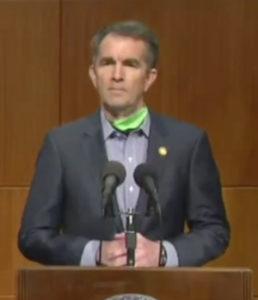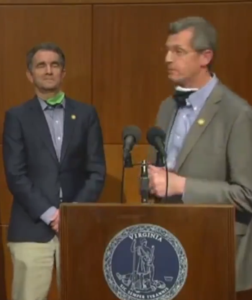Imagine for a moment that your grandmother is in a Virginia nursing home. You haven’t seen her since late February or early March when visitation was terminated due to concerns about the coronavirus.
Perhaps your grandmother has some dementia, making it impossible to chat on the phone to ask how she’s doing.
Worse, you’ve heard that at last count there have been 150 outbreaks of COVID-19 in nursing homes around Virginia. You’re now terrified that your grandmother is in peril.
That fear is real.
As of Thursday, 452 of the 769 coronavirus deaths in Virginia have been connected to long-term care facilities. That’s a staggering 59 percent of all fatalities.
Those were frail people who died alone and behind locked doors while their families begged for information.
I know what you’re thinking. Surely those with loved ones in nursing homes can go to the Virginia Department of Health’s special COVID-19 webpage and find out which long-term care facilities are experiencing coronavirus outbreaks.
No, they can’t.
The Northam administration interprets Virginia law to mean that nursing homes are entitled to the same level of privacy given to individuals.
It’s an outrageous and dangerous position. Indefensible.
As a result, there is no way to know which long-term care facilities are losing residents to the virus and which have so far escaped it. No infection rates. No body count. No accountability.
This is not a partisan issue. Republican and Democratic lawmakers alike have asked the governor to fix this. There have been suggestions that emergency legislation could be passed during a special session to address the ambiguous language in the state code.
Yet the governor seems indifferent to the issue. Here, see for yourself:
How does this suppressing #nursinghome hotspot info protect public health? It’s just like when he turned to his wife to see if it was ok to moonwalk at his blackface/KKK presser. No leadership, terrible judgment. #ReopenVirginia #Northam #valeg #VApol #VA02 #VA05 #VA07 #VA10 https://t.co/JZazR2Xc0i
— Anne Leary (@backyardconserv) May 6, 2020
What’s the next question?
I have the next question for you, Governor. Once you saw what happened at the Life Care Center outside of Seattle in February, where 125 people became infected and 45 residents died, what measures did you take to protect Virginia’s helpless nursing home population from a similar fate?
Here’s another: Did you ask your health department chief to pull the inspection records on nursing homes to ensure that substandard, publicly funded facilities had the tools to cope with coronavirus outbreaks once they began?
Oh, and one more: Did it ever occur to anyone in your administration that with nursing homes locked down the commonwealth had an absolute duty to keep the public informed about what was happening to the most vulnerable members of society?



Leave a Reply
You must be logged in to post a comment.